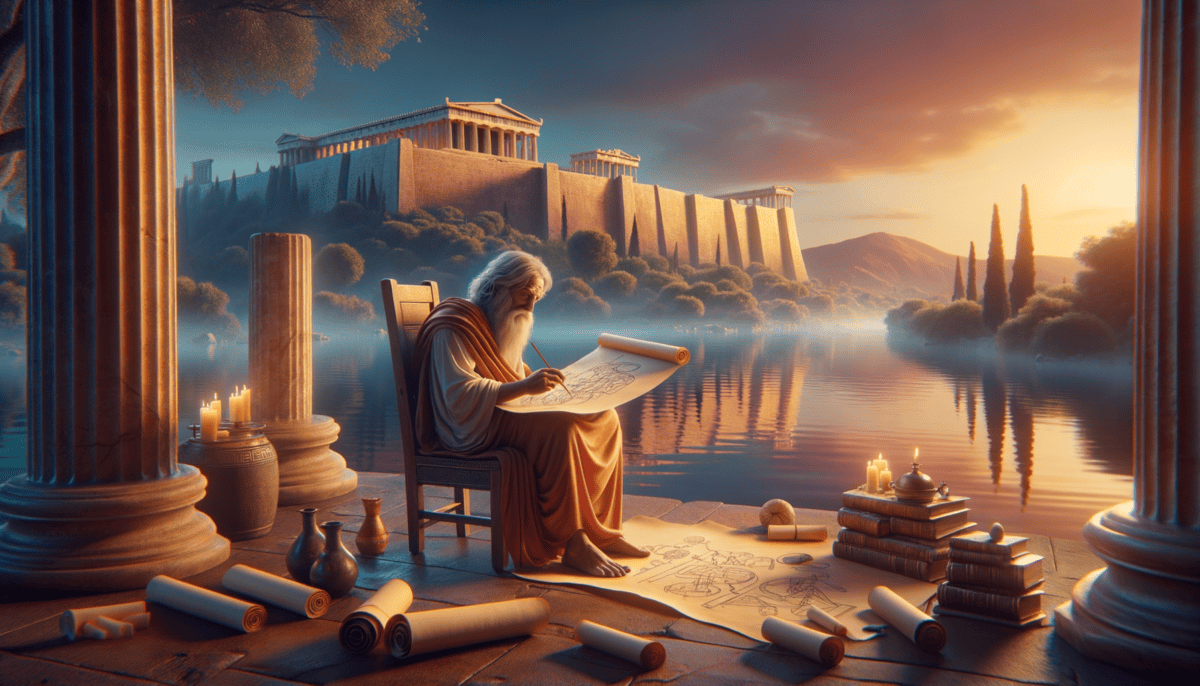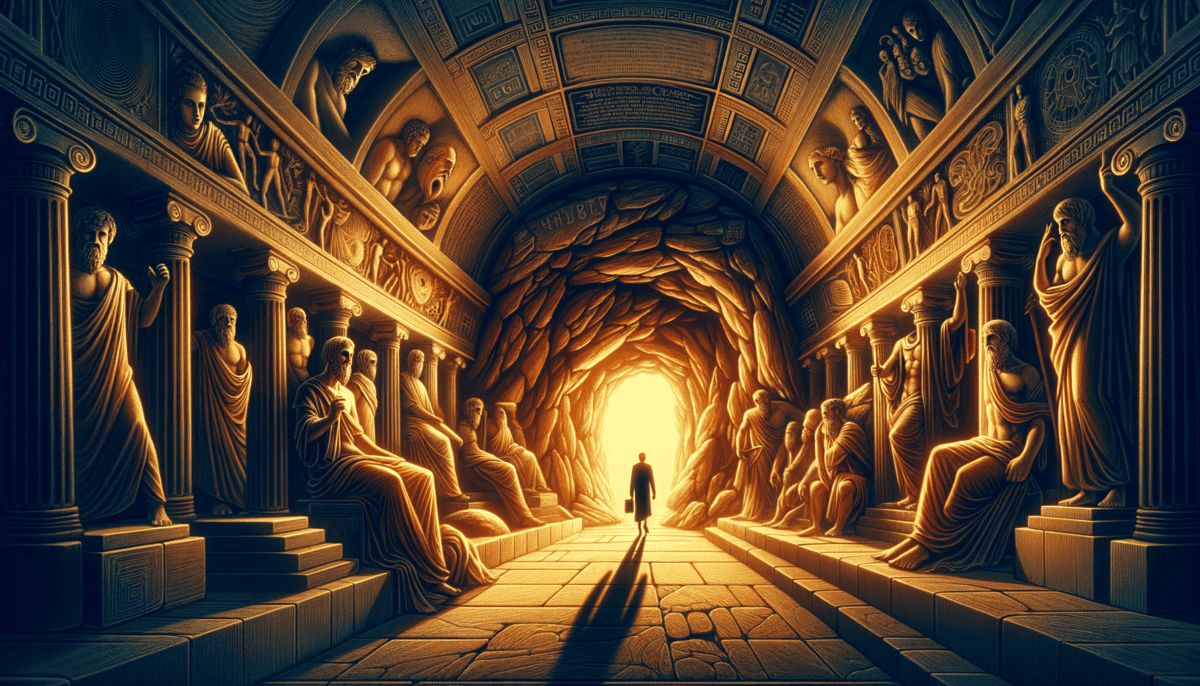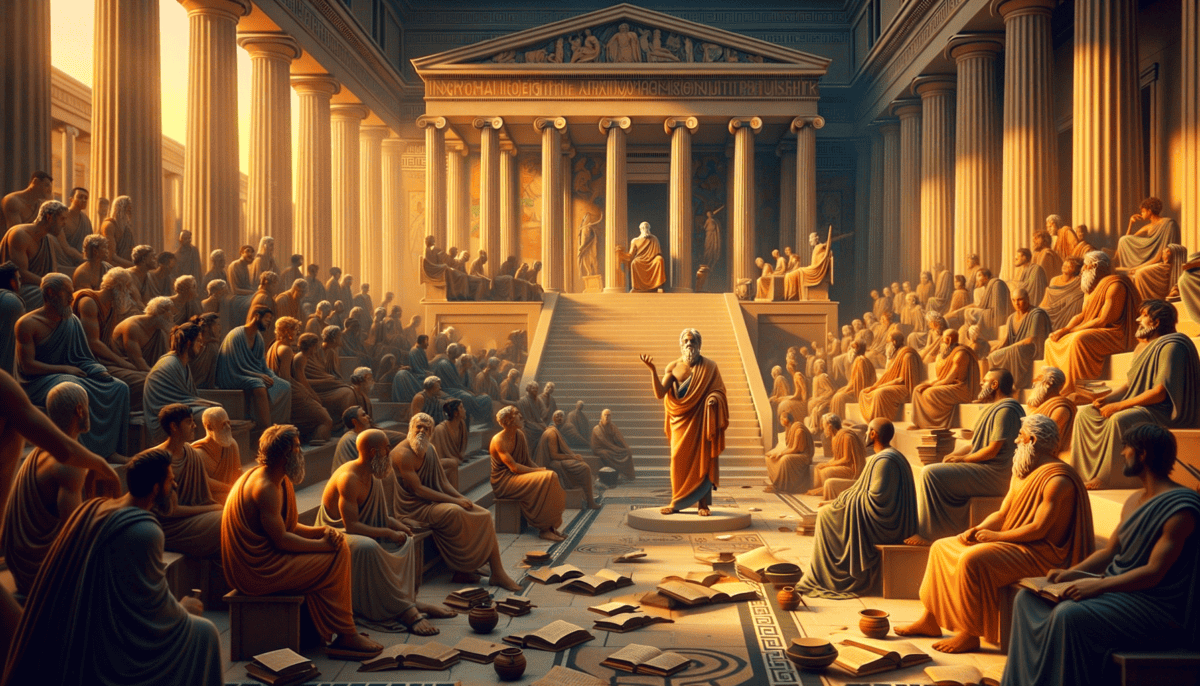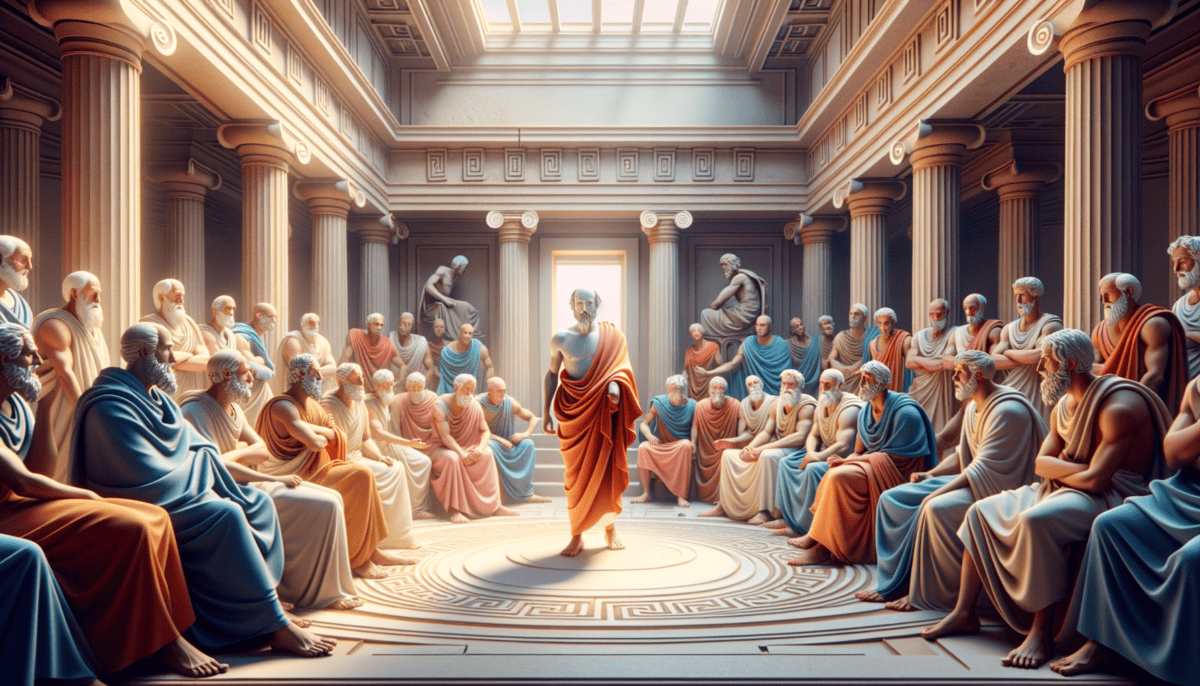The Shadow of Athens
The sun was setting over ancient Athens, painting the marble columns in warm golden light. Young Plato walked through the busy streets, his mind heavy with worry. The city he loved was changing, and not for the better.
"Why do bad leaders make our city suffer?" he wondered aloud, watching people hurry past the marketplace.
His teacher and dear friend Socrates walked beside him, his wise eyes twinkling. "That's a good question, my young friend. What do you think makes a good leader?"
Plato watched as a group of wealthy men in fancy robes pushed past a poor family. "It's not fair," he said. "The rich people have all the power, but they don't care about everyone else."
"Keep thinking like that," Socrates smiled. "Questions lead us to wisdom."
But dark times were coming to Athens. Some powerful people didn't like how Socrates made young people question things. They said he was causing trouble.
The Unfair Trial
One terrible day, soldiers came for Socrates. They said he was teaching bad things to young people. Plato watched in horror as his beloved teacher was put on trial.
"But he's innocent!" Plato cried out. "He just teaches us to think!"
The trial wasn't fair. The judges had already made up their minds. They made Socrates drink poison as punishment.
Plato felt his heart break as he watched his teacher face death bravely. Socrates' last words echoed in his mind: "The unexamined life is not worth living."
“We must create a better way to run our cities,” Plato whispered to himself. “A way where wise people make the rules, not just rich or powerful ones.”
A New Mission
That day changed everything for Plato. He decided to figure out how to make a perfect city – one where justice and wisdom ruled instead of greed and power.
He started writing down his ideas. What if the smartest and wisest people were in charge? What if leaders had to study philosophy and learn to be good before they could rule?
"The world is like a cave," he told his friends one evening. "Most people only see shadows on the wall. But we need leaders who can see the real truth."
• How to pick good leaders
• What makes a city fair
• Why wisdom matters more than money
• How to teach people to think better
As night fell over Athens, Plato looked up at the stars. He knew his journey was just beginning. His teacher's death had shown him that the world needed to change. And he was going to figure out how to change it.
Young Plato walked home through the quiet streets, his mind full of big ideas. The old Athens was fading like the setting sun, but maybe, just maybe, he could help build something better from its shadows.
His sandals clicked against the stone streets as he headed toward his house. Tomorrow would bring new questions, new ideas, and new hopes for making the world a better place.
Seeds of Change
The morning sun peeked over the horizon as Plato packed his traveling bags. After watching his beloved teacher Socrates die, he knew he had to leave Athens to find answers.
“I must learn how other cities work,” he said to his friend Dion. “There must be a better way to rule than what we have here.”
Adventures and Learning
In Egypt, Plato saw how their rulers worked with wise priests. The pyramids reached toward the sky like giant fingers pointing to the stars.
“Look how they plan everything so carefully,” he told his travel companion. “Their buildings last for hundreds of years because they think before they build!”
In Sicily, something exciting happened. King Dionysus invited Plato to his palace to share ideas about running a kingdom.
“A good ruler must be wise and love learning,” Plato told the king. “Just like a doctor must study medicine before healing people!”
The Big Idea
After his travels, Plato returned to Athens with a dream. He wanted to start a special school where people could learn how to think better and become good leaders.
He found a quiet olive grove just outside the city. “This is perfect!” he smiled. “We’ll call it the Academy!”
• How to think clearly
• Math and science
• How to be fair and just
• Ways to make good choices
Growing Wisdom
Students came from all over to learn at Plato’s school. They sat under olive trees, asking big questions and solving tricky problems. Young people learned to think carefully before making choices.
“What makes something fair?” asked one student named Aristotle.
“That’s a great question!” Plato smiled. “Let’s think about it together.”
Every day, they talked about important ideas:
“Should rich people have more power than wise people?”
“How can we make sure everyone in the city has enough food?”
“What makes a good leader good?”
Building Dreams
As the Academy grew, Plato started writing down his ideas about the perfect city. He imagined a place where smart and kind people would be in charge, where everyone had enough to eat, and where children could learn and grow safely.
Some people thought his ideas were strange. “That will never work!” they said.
But Plato kept teaching and writing. “We have to try to make things better,” he told his students. “Even if it’s hard.”
More and more people came to learn at the Academy. They carried Plato’s ideas to their own cities, like seeds spreading in the wind.
The sun set over the olive grove, casting long shadows through the trees. Inside the Academy, lamps flickered as students kept talking and thinking. Plato smiled, knowing that each question they asked was like a tiny seed that might grow into something wonderful.
And as night fell over Athens, the Academy glowed like a beacon of hope, promising that tomorrow might bring new wisdom and better ways to live together. ✨
Shadows and Light
The flickering torchlight danced on the cave wall as Plato stood before his students. Today, he would share one of his most important ideas.
The Story of the Cave
“Imagine,” Plato began, “some people who have lived in a dark cave their whole lives. They’re tied up and can only look at one wall.”
“But that’s terrible!” a young student called out. “Why would anyone want to stay in a cave?”
Plato smiled gently. “That’s just it – they don’t know anything else. Behind them is a fire, and between the fire and the people are puppets. The people only see shadows on the wall.”
Breaking Free
“Now imagine,” Plato continued, “one person gets free. They turn around and see the fire. It hurts their eyes at first because they’ve never seen real light!” ⚡
The students leaned forward, completely caught up in the story.
“The person climbs out of the cave and sees the sun for the first time. They see trees, flowers, and real people – not just shadows!”
Sharing the Truth
“What happens next?” asked another student eagerly.
“The free person goes back to tell the others what they saw. But here’s the tricky part – the cave people don’t believe them! The shadows are all they know, so they think the free person is crazy.”
• To show how hard it is to learn new things
• To help us understand that what we see might not be real
• To teach us to keep looking for the truth
New Ways of Thinking
In the Academy’s garden, students talked about what the story meant. Some thought it was about learning. Others said it was about being brave enough to think differently.
“It’s like when I thought the world was flat,” said one student. “Then I learned it’s really round! I had to change how I thought about everything!”
Plato nodded. “Sometimes the truth is different from what we first think. That’s why we must always keep learning.”
Making Changes
Some people in Athens didn’t like Plato’s new ideas. They were comfortable with the old ways of thinking.
“Why do we need to change?” they asked. “Things are fine as they are!”
“Because,” Plato answered, “just like the people in the cave, we might be looking at shadows when we could be seeing the sun.”
Growing Understanding
Day after day, Plato and his students worked to understand bigger truths. They asked questions like:
“How do we know what’s real?”
“What makes something true?”
“How can we help others see new ideas?”
The cave story spread throughout Athens. People started thinking differently about what they thought they knew.
One evening, as the sun set behind the Academy, a student asked, “Teacher, are we still in the cave?”
Plato smiled wisely. “Perhaps we are. But together, we’re learning to turn around and look for the light.” ✨
The stars began to twinkle overhead, reminding everyone that there was always more to discover, more to learn, and more ways to grow in understanding.
The Wise Leader’s Path
The sun rose over the Academy’s marble columns as Plato paced in the garden. Today, he would share his biggest idea yet – who should lead a city.
A Special Kind of Leader
“What makes a good leader?” Plato asked his students gathered in the morning light.
“Someone strong!” called out one student.
“Someone rich!” said another.
“Someone who wins lots of fights!” shouted a third.
Plato shook his head gently. “Those things don’t make someone a good leader. A true leader needs to be wise – like a philosopher!”
Learning to Lead
“But how do we find such a leader?” asked a curious student.
Plato smiled and picked up a small plant. “Just like this plant needs special care to grow strong, our leaders need special training. They must learn:
-
• Math and science to think clearly
• Music to understand beauty
• Sports to stay healthy
• Philosophy to love wisdom
• Kindness to care for others
A Different Kind of King
“But that’s not how we pick leaders now!” said one student, looking confused.
“You’re right,” Plato agreed. “That’s why many cities have problems. Their leaders think more about themselves than about helping others.”
He drew a circle in the dirt. “A good leader is like the sun – they help everything around them grow and become better.” ☀️
Hard Work and Wisdom
Plato explained that becoming a Philosopher-King takes many years of learning. “It’s like climbing a tall mountain,” he said. “It’s hard work, but the view from the top helps you see everything better.” ️
Teaching Others
As the day went on, students practiced thinking like wise leaders. They solved puzzles, helped each other learn, and talked about making their city better.
“When we learn to be wise,” Plato said, “we must help others learn too. That’s what real leaders do.”
“It’s like being the first person out of the cave,” said a student, remembering yesterday’s lesson. “We have to go back and help others see the light!”
Dreams of a Better City
Some people in Athens laughed at Plato’s ideas. “Philosophers can’t be kings!” they said. “Kings need to be strong and powerful!”
But Plato didn’t give up. He knew that wise leadership could make the world better. His students started spreading these ideas to other cities.
As the evening stars appeared, Plato looked at his students with hope. “Remember,” he said softly, “true power comes from wisdom and kindness, not from force or fear.” ⭐
The cool night breeze rustled through the olive trees, carrying dreams of wiser leaders and better cities to come.
Storms of Change
Dark clouds gathered over Athens as Plato walked through the bustling marketplace. His ideas about philosopher-kings had caused quite a stir! ️
Angry Voices
“There he is – the man who thinks we need philosopher-kings!” shouted an angry merchant. “Our leaders are strong warriors, not quiet thinkers!”
“Why should we listen to him?” others muttered. “He wants to change everything we know!”
Plato walked calmly, remembering his teacher Socrates who also faced angry crowds. ♂️
Friends and Foes
Back at the Academy, Plato’s students gathered around him. “Master, why do they fight against wisdom?” asked young Aristotle, his brightest pupil.
Standing Strong
More students came to learn from Plato every day. They practiced thinking deeply and asking good questions.
But not everyone liked these changes. Some powerful people in Athens were worried:
-
• Rich merchants feared losing their influence
• Military leaders didn’t like peaceful solutions
• Politicians worried about wise leadership
• Traditional teachers disliked new ideas
• Some parents feared change for their children
Teaching Through Stories
Plato found a clever way to share his ideas. He wrote stories!
“Stories help people understand better than arguments,” he told his students. “They touch both the heart and the mind.”
Growing Wisdom
Each day, more people came to hear Plato’s ideas. Some traveled from far away!
“Your ideas about justice and wisdom are spreading,” said Aristotle proudly. “People are starting to understand!”
Building Understanding
Plato worked hard to explain his ideas clearly. He showed how:
Good leaders care about everyone, not just themselves
Learning helps us make better choices
Wisdom is more valuable than gold
Hope for Tomorrow
As the storm clouds cleared, a rainbow appeared over Athens.
“Look!” said a young student. “Even the sky shows us that after dark times, beauty can come!”
Plato smiled. Change was hard, but his ideas were taking root. Like seeds in spring, they would grow into something wonderful.
That evening, as the stars began to twinkle, Plato wrote more of his thoughts about building a better world. The candle flame danced as his pen moved across the page, sharing wisdom that would last for thousands of years. ✨
The Eternal Light
The morning sun sparkled over Athens as Plato stood at the Academy’s entrance. Years had passed, and his dream had grown bigger than he ever imagined! ☀️
Seeds of Change
“Look, Master Plato!” called out Aristotle, now a wise teacher himself. “Students are coming from all over the world!”
A New Dawn
People were different now. Instead of angry shouts, Plato heard thoughtful questions. Children played “philosopher games” in the streets, pretending to solve big problems.
“Your ideas have changed how we think about everything!” said a visiting teacher from Egypt. “Even kings now study wisdom before making big choices.”
The Ripple Effect
Plato’s ideas spread like rings in a pond when you drop a pebble:
-
• Cities started choosing wise leaders
• Schools taught children to think deeply
• People tried to be fair and just
• Leaders cared about learning
• Everyone asked better questions
A Special Moment
One sunny afternoon, a little girl tugged on Plato’s robe. “Teacher,” she said, “I want to be a philosopher-queen when I grow up!”
Plato’s eyes sparkled with joy. This was what he had hoped for – a world where wisdom was valued more than gold.
The Living Legacy
His students spread across the world, starting new schools and sharing what they learned.
The Greatest Victory
Walking through Athens now, Plato saw something beautiful:
People solving problems by thinking carefully
Leaders asking wise questions before making choices
Children learning to love wisdom and truth
A Dream Come True
That evening, Plato sat writing under the stars. ✨
“We did it, Socrates,” he whispered, remembering his old teacher. “We helped make the world a little bit better.”
The Academy’s light glowed warmly in the darkness, a beacon of hope and wisdom. Young minds would always gather here, reaching for the bright stars of knowledge.
And somewhere, in the heart of every person who loved wisdom, Plato’s dream lived on – growing, changing, and making the world more beautiful, one thought at a time.






